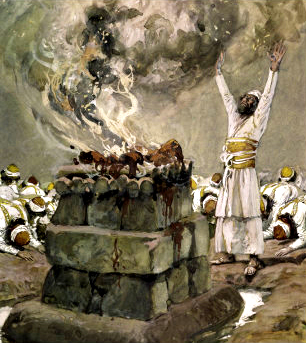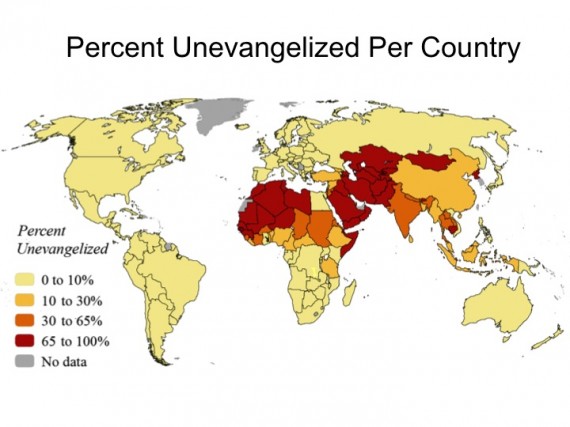Have you ever read about the lukewarm believers in the church of Laodicea (Revelation 3:15-16)? I am sure you have. Many people wonder about these lukewarm believers and what Revelation 3 teaches about their eternal destiny.

Here is a question that a reader recently submitted:
What does the Bible mean when it refers to Lukewarm believers? Will they be able to enter the Kingdom of Heaven?
Lukewarm Believers in Laodicea
Almost any Bible commentary will provide some decent background about this imagery of the lukewarm believers in Revelation 3:15-16. These books will probably tell you that the city of Laodicea had water piped in from Hieropolis, which is a few miles to the north. By the time the water reached Laodicea, it was lukewarm water.
Have you ever drunk lukewarm water? It’s not so good. You either want it hot or cold, but unless you are really thirsty, almost nobody drinks lukewarm water. You might even spit such water out, just as John writes in Revelation 3:16.
Though I hear that Europeans sometimes drink soft drinks and beer at room temperature (any Europeans want to confirm or deny this?), I think most people prefer their drinks to be either hot or cold, but not lukewarm. This is even true for Europeans with some drinks (like tea or coffee). I like iced tea and iced coffee (even if neither is sweetened), and I like hot tea and hot coffee, but I will rarely drink lukewarm tea or coffee. Blech!
So this is the imagery that John is using in Revelation 3:15-16 when writing about lukewarm believers in Laodiciea. Through John, Jesus is telling the believers to be either hot or cold, but not lukewarm.
Some pastors like to say that God only wants “on fire” Christians, that a “cold” Christian is not desired. Then they quote this verse to prove it. Well, you cannot use this verse to make that point. Jesus says, “I could wish you were cold or hot.” Don’t read too much into the imagery. There are different ways to follow Jesus, and Jesus isn’t too concerned about how you follow Him; only that you do.
There is not a whole lot in the context which helps us determine who is a lukewarm believer and who isn’t. These lukewarm believers claimed to be rich and wealthy, without needing anything (Revelation 3:17), but in reality, they were wretched and poor. Jesus challenges them to be zealous and to repent, and to let Him enter into fellowship with them (Revelation 3:19-20).
We could probably say that lukewarm believers are those who are self-sufficient and think that they don’t really need anything from God to get through life, and who don’t really think they need to repent of anything, and who don’t think that their life will be much better if they spend time with Jesus.
 A Christian who is refreshing to be around and a Christian who is fired up is a follower of Jesus know knows they don’t have it all together, who knows that they aren’t perfect, and who knows that there is nothing better than hanging out with Jesus as He leads us into the world.
A Christian who is refreshing to be around and a Christian who is fired up is a follower of Jesus know knows they don’t have it all together, who knows that they aren’t perfect, and who knows that there is nothing better than hanging out with Jesus as He leads us into the world.
So that answers the first part of this question about the lukewarm believers. What about the second part of the question …
Will Lukewarm Believers Enter the Kingdom of Heaven?
Well … there are two answers here. There is the answer to the question that was asked and then there is the answer to the question that I think the person might have been trying to ask (though I could be wrong).
So first let me answer the question that I think the person was trying to ask. I think they were trying to ask, “Will lukewarm believers enter heaven?” or “Will lukewarm believers go to heaven when they die?” or maybe even “Can lukewarm believers still have eternal life?” I think that this is what the person was asking.
And the answer to these questions is an unqualified YES.
Eternal life is a free gift of God to everyone and anyone who simply and only believes in Jesus for it (John 3:16; 5:24; 6:47, etc.). Good works play absolutely no role whatsoever in earning, keeping, or proving eternal life (Eph 2:8-9; Rom 4:5; etc.)
 So if a person believes in Jesus for eternal life, they are given eternal life by God. Even if they become a lukewarm believer, they continue to have eternal life. Yes, Jesus says He will “vomit” them out of His mouth (Revelation 3:16), but this has nothing to do with losing eternal life. Jesus is just continuing the imagery of the hot and cold water.
So if a person believes in Jesus for eternal life, they are given eternal life by God. Even if they become a lukewarm believer, they continue to have eternal life. Yes, Jesus says He will “vomit” them out of His mouth (Revelation 3:16), but this has nothing to do with losing eternal life. Jesus is just continuing the imagery of the hot and cold water.
Furthermore, for those who overcome, that is, for those who remain either cold or hot, Jesus does not say, “You get to go to heaven when you die,” but rather, “You get to sit with Me on my throne” (Revelation 3:21). So you see? Being hot or cold does not earn eternal life. Instead, it earns the reward of co-ruling and co-reigning with Jesus Christ in His Kingdom.
And this brings us back around to the question that was actually asked. The person who sent in this question wanted to know if lukewarm believers will be able to enter the Kingdom of Heaven. The answer? No. At least, not as long as they remain lukewarm believers.
You see, the Kingdom of Heaven is not the same thing as “heaven.” The Kingdom is not the same thing as “eternal life.” The Kingdom of Heaven is the rule and reign of heaven, just like the Kingdom of God is the rule and reign of God. Believers who live according to the values and principles of the Kingdom of Heaven can begin to experience the rule and reign of heaven in their life right now! But if believers refuse to live according to the values of the Kingdom of heaven, then obviously, they cannot enter into the experience of the Kingdom of Heaven.
An Illustration
Let’s say someone gives you a million dollars and along with it you get a free membership to a Millionaire’s Club. Wonderful! But let us also say that the only condition to enter the club and enjoy all that it has to offer is that men have to wear a tux and women have to wear a nice evening gown. On the first night you wear jeans and a t-shirt. The guard up front says, “I am sorry. You cannot enter.”
“But I am a millionaire!” you say.
“I am sorry,” he responds. “You cannot enter the club without proper attire.”
This is somewhat how it is with the Kingdom of Heaven. As a believer, you have everything you need for entrance. But if you don’t adopt the principles and values of the Kingdom, this doesn’t mean you don’t belong … it just means you cannot experience it.
What sort of values are needed to experience the Kingdom of Heaven? Well, the sort of values which will make you either hot or cold to Jesus … values such as kindness, generosity, humility, patience, love, self-control, and other such Christlike attitudes.
So just to sum up … lukewarm believers are those who simply do not follow Jesus and don’t really seem to want to. Yes, they are still believers who have eternal life and will go to heaven when they die, but they are missing out on most of what the Christian life has to offer and due to being lukewarm believers, cannot experience the Kingdom of Heaven in all its joy.




 Recently someone sent in a question about the sin unto death.
Recently someone sent in a question about the sin unto death.


 It was the same for the Israelites. The Mosaic Law was to maintain peace, order, security, and safety. Because Israel was intended to be a theocracy, there were also numerous laws related to the worship of God, but again, these were not intended to grant a person eternal life, but simply to maintain fellowship with other members of the Israelite community.
It was the same for the Israelites. The Mosaic Law was to maintain peace, order, security, and safety. Because Israel was intended to be a theocracy, there were also numerous laws related to the worship of God, but again, these were not intended to grant a person eternal life, but simply to maintain fellowship with other members of the Israelite community. Note that this level of revelation might be different for different people of different ages and of different mental capacities.
Note that this level of revelation might be different for different people of different ages and of different mental capacities.
 On the one hand, there are countless numbers of people who think they received eternal life when they walked an isle at a revival or evangelism crusade. Or maybe they signed a card, raised a hand, or said a prayer. If you ask someone how they know they have eternal life, and they say something like “When I was 10 my church had a guest evangelist come speak, and when he gave an altar call I went forward and prayed the sinners prayer” it is possible that this person does not actually understand what the Bible says about how to receive eternal life.
On the one hand, there are countless numbers of people who think they received eternal life when they walked an isle at a revival or evangelism crusade. Or maybe they signed a card, raised a hand, or said a prayer. If you ask someone how they know they have eternal life, and they say something like “When I was 10 my church had a guest evangelist come speak, and when he gave an altar call I went forward and prayed the sinners prayer” it is possible that this person does not actually understand what the Bible says about how to receive eternal life. But through all these emotions and feelings, remember this: God loves you more than you can possibly imagine. Though what you are going through right now is extremely painful, God is with you in this time and is seeking to strengthen and solidify your faith during this time. You are experiencing a winter in your relationship with God, a time that some have called “the dark night of the soul.” But spring will come. The light will dawn once again. The sense of God’s presence will return.
But through all these emotions and feelings, remember this: God loves you more than you can possibly imagine. Though what you are going through right now is extremely painful, God is with you in this time and is seeking to strengthen and solidify your faith during this time. You are experiencing a winter in your relationship with God, a time that some have called “the dark night of the soul.” But spring will come. The light will dawn once again. The sense of God’s presence will return.
 So, for example, the word “saved” might refer to being delivered from one’s enemies, or getting healed from a sickness, or being rescued from drowning at sea. Obviously, these words are not related to gaining or keeping eternal life. I would guess that the majority of times the words saved, save, salvation, etc., are used in Scripture, they are used in this way (e.g., Matt 8:25; Acts 27:31).
So, for example, the word “saved” might refer to being delivered from one’s enemies, or getting healed from a sickness, or being rescued from drowning at sea. Obviously, these words are not related to gaining or keeping eternal life. I would guess that the majority of times the words saved, save, salvation, etc., are used in Scripture, they are used in this way (e.g., Matt 8:25; Acts 27:31). Once you see the difference in Scripture between the word “saved” and the terms “eternal life” or “everlasting life” or even something like “justification” you begin to see that while there are numerous verses which talk about saving something that can be lost, there is not a single verse in the Bible which talks about losing eternal life, losing everlasting life, or losing our justification. All of these gifts of God, once given, are never revoked or taken back.
Once you see the difference in Scripture between the word “saved” and the terms “eternal life” or “everlasting life” or even something like “justification” you begin to see that while there are numerous verses which talk about saving something that can be lost, there is not a single verse in the Bible which talks about losing eternal life, losing everlasting life, or losing our justification. All of these gifts of God, once given, are never revoked or taken back.